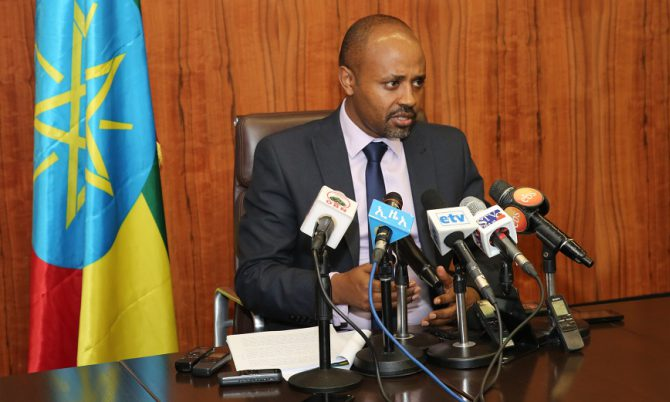Ethiopia Taking Adjustments on Macro-economic Imbalance - ENA English
Ethiopia Taking Adjustments on Macro-economic Imbalance

Addis Ababa June 29/2019 Ethiopia has been engaged in performing adjustments on its macro-economic imbalance which hindered the nation from generating sufficient finance to pay off its accumulated debt, the Ministry of Finance said.
Ethiopia, which have been taking commercial loans to finance its mega projects and development programs, was unable to repay its debt accumulated for many years.
State Minister of Finance, Eyob Tekalign told ENA that the imbalance is characterized mainly by imbalance between revenue and expenditure.
“The macro-economy imbalance is largely manifested by imbalance between revenue and expenditure and a serious imbalance in the foreign trade sector,” the State Minister stated.
This has mainly due to huge public investment, which is the major drive for the Horn Africa's nation fast economic growth; low level of export performance and weak private engagement.
Presenting its 11 months performance to the House of Peoples’ Representatives, the Ministry said the external and domestic debt of the country has hit 27 billion US dollars and 731 billion birr respectively.
The country has managed to pay 9.4 billion USD in the current fiscal year, the Ministry reported.
Noting that the country's fast economic growth was mainly driven by the public investment, Eyob said this has forced the government to took huge amount of loans to fund projects.
“We borrowed a lot of money but we have been unable to repay on the given time,” he pointed out.
“The economy has been growing you know, consistently over the last decade and we have borrowed significantly for infrastructure projects which really failed to achieve the desire result,” he pointed out.
The sweeping economic and political reforms that Ethiopia has been undertaking for over a year brings opportunities to take some corrective actions on the imbalance.
“So what the reform does is one identifies wasteful public expenditure as one of a critical areas of challenge and made significant corrections. Corrections include that any additional new investment by the public sector has to go serious scrutiny ensuring that the feasibility of that project is properly analyzed and justified”, he said.
Ethiopia, which was largely taking commercial loans in the past, has avoided it as part of the economic measures.
“We have already avoided commercial loans because these loans when they have matured have really created a challenge of accumulated debt,” he indicated.
In addition to avoiding commercial loan that is seriously affecting the county’s ability to ascertain a reasonable level of balance of payments, Eyob said “the government has made some effort to pay back our debt and was working with partners to restructure the debt repayment schedule.”
As a result, the country has shifted its attention to concessional loans considering the grace period and maturity date of the loans.
More importantly, the Horn African nation currently focuses on the supply side of the economic growth which is a significant shift from the demand.
“We have prioritized supply side of economic growth which means working on productive sectors including mining, tourism, manufacturing, even agriculture we are still importing wheat and edible oil which in an economy like Ethiopia is really unacceptable”, he said.
Zemedeneh Negatu, an economist and managing partner, Ernst and Young, supports the government's decision to stop commercial loans and efforts to correct the macro-economic hurdles.
“At the moment, the government is trying to figure out multiple ways to reduce the debt burden on the economy by readjusting the debt repayment period, by avoiding new debts and stopping from launching new projects which I think is appropriate,” he said.
Appreciating the rapid economic growth in the country over the past 13 years, which the World Bank, IMF and other international financial entities recognized Zemedeneh emphasized the need to revise the fiscal policy to rectify the imbalance.
Noting that the government cannot stop to borrowing, as it is one of its the sources in the efforts to fund public projects, Zemedeneh who is also Global Chairman of CPA (US) said the government should be conscious about the potential of the country when it decided to borrow.
“Honestly speaking, you don’t stop borrowing. Every country and government borrows to facilitate its development. However, we need to borrow smartly by taking into account is it affordable, is it going to the right projects, do we have the right project management system and so...”